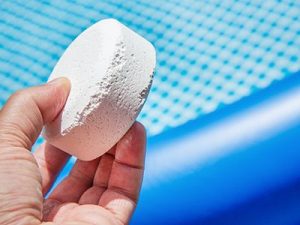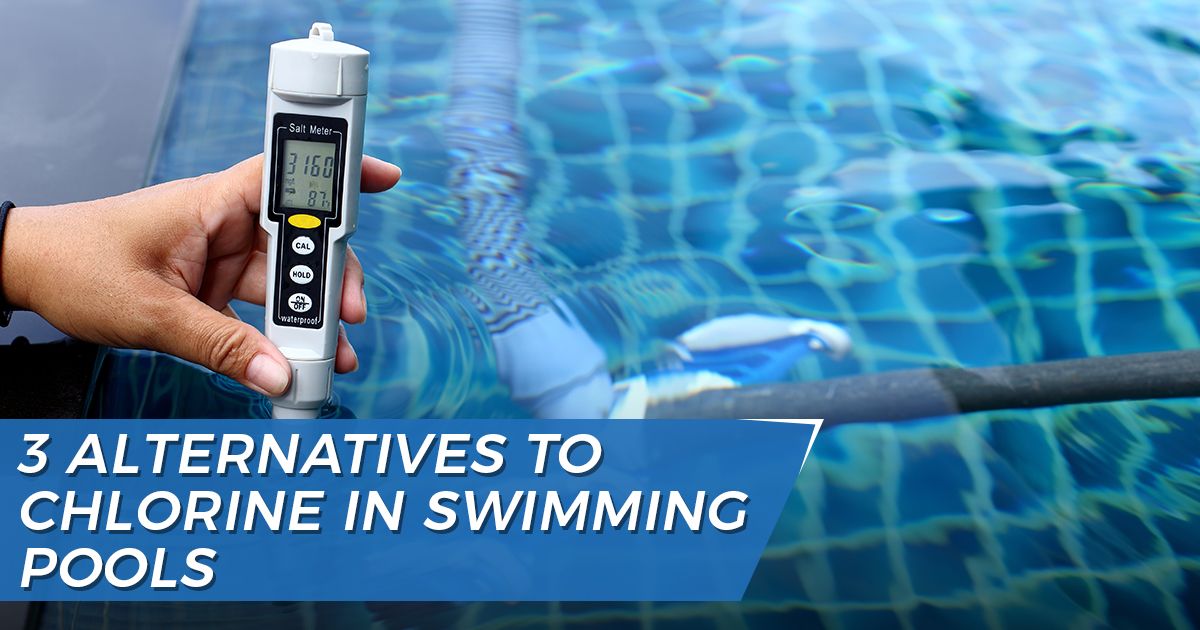3 Alternatives to Chlorine for Swimming Pools
Chlorine tends to be a go-to sanitation chemical for many pool-owners. Not only does it kill germs and bacteria, but it also oxidizes pool water—eliminating organic debris like body oil, perspiration, and hair. By deterring algae, a chlorine system can assure your pool’s water, floor, walls, and tile are clean around the year.
Still, some homeowners opt for alternatives to chlorine. Chlorine has a rather strong odor, and it can aggravate the eyes and skin due to allergic reactions. Fortunately, several alternatives to chlorine exist. While some alternatives technically still utilize chlorine, albeit naturally creating it, others sidestep the issues caused by chlorine altogether.
Alternatives to Chlorine for Swimming Pools
You may find yourself still using the chemical alongside these alternatives to chlorine for swimming pools, but you certainly won’t have as many drawbacks. From cost to cleaning efficiency, these great options can assure pool cleanliness while maintaining soothing, soft waters. Let’s check them out.
Salt Systems
 The first pool chlorine alternative is a salt system. Saltwater pools have become incredibly popular, in recent years. In fact, more than half of in-ground pools utilize salt-created chlorine. It’s reliable, convenient and relatively cheaper than traditional chlorine. Because it’s natural, it’s much gentler on the eyes, hair, and skin.
The first pool chlorine alternative is a salt system. Saltwater pools have become incredibly popular, in recent years. In fact, more than half of in-ground pools utilize salt-created chlorine. It’s reliable, convenient and relatively cheaper than traditional chlorine. Because it’s natural, it’s much gentler on the eyes, hair, and skin.
Salt systems carefully measure your pool’s water, identifying the optimal water balance to maintain clean, balanced depths. Once you’ve determined your pool’s sanitary needs based upon its overall volume, you can set up your salt system to operate as efficiently as possible.
Today’s most advanced salt systems offer easy interface control. By giving you instant access to check and control water flows, chlorine levels, and system power levels, a salt system’s easy-use interface assures you’re able to stay on top of your pool’s chemical balance at a moment’s notice.
A salt water system offers multiple levels of salt-based chlorine output, too, often installed with either a single-speed or variable speed pump. Every second of waterflow is gauged by the system’s flow sensor, too, so your pool’s equilibrium is automatically maintained. As such, it’ll spare you the regular costs associated with manually controlled systems working overtime to rebalance the pool.
Mineral Sanitizers
Another one of the great alternatives to chlorine for pools is the mineral sanitizer system. A mineral sanitizer enhances a pool’s cleanliness by introducing small amounts of copper and ionic silver into a pool’s water—greatly reducing bacteria and algae. The extra sanitization reduces the need for chlorine—so, while you’ll still need to use chlorine, you won’t need to use nearly as much.
Copper is a rather strong algaecide, and silver is often used as a bactericide in various products. When your pool’s water comes into contact with the copper and silver, each mineral releases positively charged ions. These ions eliminate negatively charged contaminants, keeping your pool clean at a consistent rate as one of the most consistent alternatives to chlorine for pools.
These mineral ions aren’t affected by heat or sunlight, too, making them excellent options if your pool’s temperature tends to fluctuate often—either due to seasonal temperature shifts or using a heater. Mineral sanitizer systems come in two types: active method devices and passive method devices.
Active method mineral sanitizers apply low-level, direct current to electrodes plumbed into the filtration system. These electrodes, created from combinations of the above-mentioned copper, silver and sometimes zinc, rapidly release charged ions into your pool’s water as electrolysis erodes them. You’ll need to replace your system’s electrodes every so often, however, to make sure your pool stays sanitized.
Passive method mineral sanitizers, meanwhile, don’t require electricity to function. Instead, they feature a flow-through cartridge which contains a silver-coated substrate—injected with additional copper. This substrate contains a number of small, pebble-sized pieces contained within the plastic cartridge. When installed into a pool filtration system, the cartridge slowly released positively charged ions.
A mineral sanitizer can keep your pool clean for up to six months before requiring pool maintenance. These sanitizers are also highly effective when working side-by-side with chlorine systems, as they don’t interfere with chlorine, itself.
UV Ozone Systems
Ozone is active oxygen, also called O3. While it occurs naturally in the atmosphere—protecting us from the sun’s rays—it can be used as an effective sanitizer. Some pool systems are made to utilize ozone for pool and spa purification, harnessing the power of pure oxygen to completely eliminate bacteria and viruses.
Capable of purifying water quickly, and efficiently, ozone can clean pool water about 3,000 times faster than traditional chlorine—leaving no by-products behind except pure oxygen. Ozone, itself, can be produced by an ultraviolet, or UV, light. As one of the best alternatives to chlorine for swimming pools, an ozone system powered by UV lights is one of the most energy efficient around.
The system’s UV lamp directly converts oxygen into ozone by dividing oxygen molecules into individual atoms. These atoms recombine with other oxygen molecules to form ozone—a process which occurs instantly, injecting the resulting gas into the system’s plumbing return line.
This ozone gas is harmless to your pool’s equipment. When applied properly, ozone can even be the gentlest water purifier in existence. While you might still need to shock your pool with occasional chlorine, the use of ozone can greatly lower your sanitization costs, year-round.
Finding the Best Alternatives to Chlorine for Swimming Pools
Now that you know about the best chlorine-alternative options around, what should you do next? Here at GPS Pools, we suggest giving our team a call. We’ve spent years optimizing pools for supreme cost-efficiency and effectiveness. Whether you’re resurfacing or remodeling your pool deck, resurfacing your concrete pool, or need a pool system upgrade—we have you covered.
Sometimes, the best pool chlorine alternative is right around the corner. Still, it’s a good idea to get a professional’s opinion before deciding on an installation. If you’re ready to revamp your swimming pool with some of today’s leading technology, give our Lutz location a call at (813) 948-9091. Or, contact our Land O’Lakes location at (813) 345-8596.

